
Energy supplier study 2020: energy and utility companies in the corona crisis
As experts in the energy supply industry and digital transformation, we conducted a study on the digitalisation measures of German energy suppliers. The effect of the Corona pandemic is interesting. The most striking aspect is that managers prefer to work from home, while employees are predominantly in the company office, according to the study by the management consultancy AXXCON.
The coronavirus crisis is accelerating digitalisation at German energy supply companies
95 per cent of the energy supply companies surveyed in a study by management consultants AXXCON in May are convinced of this. 66 per cent even see the pandemic as a strong driver. When it comes to working from home, however, the picture is mixed: at the height of the crisis, three quarters of managers worked from home. However, less than half of administrative and office staff did so in 80 per cent of companies, and even less than a third in 60 per cent. And: only 46 per cent of companies consider working from home to be the model of the future. “This reluctance shows that, despite the predicted surge in digitalisation, the industry tends to be more traditional and largely wants to stick to being in the office,” says Dirk Stieler, former partner and expert for the energy industry at the management consultancy AXXCON.
114 managing directors, IT managers and chief digital officers were asked about the impact of the crisis on their company’s digital transformation. This is an extension of the study “Energy supply companies in the digitalisation trap?”, which was conducted among a total of 151 managers in the industry before the outbreak of the pandemic. It is therefore possible to make statements about the reaction of the energy supply companies to the crisis as well as a before-and-after comparison. Before and after coronavirus, around 60 percent of energy supply companies had planned concrete steps for their further digitalisation. Conversely, this means that around 40 per cent of companies have not yet done so. Stieler: “Without a catalogue of measures, there will be no progress. For the time being, this is just lip service.”
New trend towards agile working
However, the areas in which companies want to make progress with digitalisation have changed significantly since the start of the pandemic: For example, the number of utilities planning specific measures to modernise their IT infrastructure fell by 20 percentage points and by 35 percentage points in the area of information security. By contrast, the topic of agile working methods was mentioned around 20 percentage points more frequently. “This is an indication that the technology worked well during the crisis, but that employees do not have the appropriate skills for virtual collaboration,” says Stieler.
Also striking in the before-and-after comparison: the proportion of companies stating that they do not need employees with new skills in areas relevant to digitalisation has risen from 40 to 60 per cent. The need for product and service managers, for example, has fallen by 15 percentage points, while the decline for IT platform architects is ten percentage points. In contrast, the demand for Scrum Masters and UI/UX developers has remained at almost the same level. Stieler: “The crisis has worsened the financial situation of the EVU. The figures indicate that personnel costs are to be saved.” However, the trend towards the expansion of agile methods is also evident here.
More followers than first movers
Efficient energy use and innovative services and sales strategies are seen by all companies as the most important areas of digitalisation. This is followed by portals and apps for end customers, mobility and portals and apps for business customers. However, only a few companies see themselves as first movers in these developments – between 27 and 12 per cent, depending on the area. The highest proportion of pioneers is in the area of efficient energy use, followed by mobility. “In these areas, the energy supply companies have a political mandate, which they are also implementing. In other – economically significant – fields, they tend to opt for the low-risk follower strategy,” says Hendrik Prielipp, consultant and expert for the energy industry at AXXCON. This also points to a strong orientation of the energy supply companies towards political goals and support measures: every second energy supply company surveyed is operating or planning the construction of a high-speed data network with the aim of offering services in the areas of Internet, telephone and, in some cases, TV for both business and end customers.
Energy supply companies in the digitalisation trap
The biggest obstacles to digitalisation from the perspective of the companies surveyed are data protection (56 per cent), silo thinking within the company (54 per cent) and a lack of employee expertise (53 per cent). In 46 per cent of companies, management is the main driver of digitalisation, followed by the IT department (19 per cent), specialist departments (13 per cent) and cross-departmental teams (nine per cent). Only three per cent of respondents named the Chief Digital Officer in this position. This result shows that digitalisation has reached company leaders. At the same time, it indicates that the responsibility for planning and implementing specific projects is not yet in the right place to ensure a consistent approach. To this end, a CDO specialising in the topic or a digitalisation project management office should take the lead.
“Overall, digitalisation at the energy supply companies is still going slowly, caught between risk aversion and pressure to innovate. There is no sign of a truly forward-looking and consistent approach,” says Prielipp. According to him, this harbours a great danger: “Without new innovative services, sales strategies and business models, also with regard to a decentralised energy supply, energy supply companies are jeopardising their future.”
151/114 managing directors, IT managers and chief digital officers of German energy suppliers were surveyed for the study “Energy supply companies in the digitalisation trap” by management consultancy AXXCON. The telephone survey was conducted in January/May 2020. You can purchase the study for 199 euros plus VAT. Or make an appointment. We would be happy to present the study to you in a personal meeting.
About AXXCON
AXXCON is an independent and 100% owner-managed management consultancy specialising in transformation. The focus is on the core areas of digital, IT and organisation. AXXCON has been successfully supporting large and medium-sized companies in the energy sector, banking and insurance, service sectors and industry in the implementation of their transformation projects for many years. For the sixth time in a row, AXXCON has been recognised by brand eins and Statista as one of the best consulting firms in Germany.
We look forward to presenting our results to you in a personal meeting. Please feel free to contact us. Michael G. Möller, Partner at AXXCON, is at your disposal as your contact person and expert.
Publications of the press release:
ZfK – Zeitung für kommunale Wirtschaft (published on 05.07.2020)
Presseportal (published on 06.07.2020)
Aachener Nachrichten (published on 06.07.2020)
General Anzeiger Bonn (published on 06.07.2020)
Energie & Management (published on 06.07.2020)

